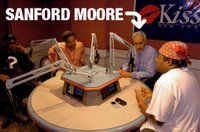
From The Associated Press…
--------------------------------------------------------
Spotlight shined on lack of racial diversity in New York ad agencies
NEW YORK — Why, city officials demanded, were there virtually no black staffers at New York’s elite advertising agencies? The year was 1968. Agencies’ executives vowed to fix the problem.
They did not.
Now, under steady pressure from advocates and the threat of public embarrassment by city officials, they have renewed those promises. Sixteen of the city's top ad agencies have agreed to recruit more minorities, especially blacks. They will also diversify senior management and let city officials monitor them for three years.
As Advertising Week 2006 festivities begin, the agreements signed with the city’s Human Rights Commission offer a rare glimpse inside one of New York's core industries — and reveal that its work force does not look much like the nation.
“This is a big deal — that advertising agencies actually signed written agreements to make these changes,” said Burtch Drake, president of the American Association of Advertising Agencies. “Will you see an overnight sea change? No. But over time you’ll see other cultures integrated into advertising.”
About 3 percent of advertising staffers nationally were black in 2005, according to U.S. Bureau of Labor data, with 1.6 percent Asian and 7.5 percent Latino. In upper management, the diversity is virtually nonexistent, data show.
Under the agreements, big agencies including WPP Group PLC’s Ogilvy & Mather, Publicis Groupe SA’s Saatchi & Saatchi and Draft New York, part of Interpublic Group of Cos. Inc., will devote staffing and resources to finding and keeping more minority staff members. They will set up in-house diversity councils, and executives who meet the new hiring goals will be rewarded accordingly.
“This strategy is deliberate — we really wanted to change things across the board,” said Patricia L. Gatling, head of the human rights commission.
Spokesmen for advertising agencies have mostly declined to comment on the issue. Young & Rubicam, a unit of WPP, issued a statement saying the agency “believes that diversity is a business imperative and we are pleased to have come to an agreement with the Human Rights Commission that reinforces our diversity initiatives.” Omnicom Group Inc., parent of DDB Worldwide and BBDO Worldwide, has pledged $1.25 million to diversity initiatives within the company and will help establish a new advertising curriculum at Medgar Evers College in Brooklyn.
Why did the city focus on advertising? It is hardly the only big industry that lacks racial diversity. City officials said it was time to revisit an issue first raised at their hearings in 1968. And Gatling, a former prosecuting attorney, took a tough approach.
And then there is Sanford Moore.
The veteran black advertising guru, 65, for decades wrote letters, staged protests and pushed public officials to highlight the lack of diversity in advertising. Off and on for 13 years, he has also discussed it on his Sunday night talk show, “Open Lines,” on the radio station WRKS-FM. His on-air name is Charles W. Etheridge III.
The agreements are a result of Moore’s determination, said Eugene Morris, president and CEO of E. Morris Communications, a Chicago-based agency specializing in the African-American market.
“He has been a bulldog,” said Morris.
Moore conceded: “I’m obstinate. I’ve kept records on this since 1968.” He added, “I call advertising the last bastion of Jim Crow.”
The relationships he built through his lobbying with city public officials, including Gatling and City Councilman Larry Seabrook, prompted the Human Rights Commission to begin subpoenaing advertising agencies’ staff records in 2004.
Potentially embarrassing public hearings, at which agency executives would likely have faced tough questions during the industry’s annual Advertising Week, had been scheduled for Monday. They were canceled after the diversity agreements were announced earlier this month.
Seabrook will hold hearings Tuesday on a related issue: the struggles that black media have getting big clients to advertise with them.
“The advertising issue isn’t just about hiring, it’s about doing business,” Seabrook said, referring to the vast but mostly white industry of artists, writers and smaller ad agencies that subcontract with big agencies. “African Americans participate as consumers — we spend $350 billion a year in this country. But we are not getting our just due.”
Earl G. “Butch” Graves Jr., CEO of Black Enterprise Magazine said that some big corporations refuse to court minority consumers, but much of the blame lies with advertising. “They must hire people from top to bottom that look like society. How can an ad agency be charged with having a worldwide assignment for marketing and have all the people in the room be white men?”
Advertising experts say it is tough to find and keep minority ad professionals. Entry-level salaries are around $30,000 a year, likely unappealing to some potential recruits, said Mary Hilton, vice president of public affairs for the American Advertising Federation.
Black students often must be recruited into college advertising programs, said Jerome Williams, an advertising professor at the University of Texas at Austin. Many have never considered it because they know of no blacks in the industry.
Alicia Evans, a black advertising professional, said when she worked at a large, mainstream agency she won raves from clients. But she was never embraced by her mostly white co-workers and supervisors.
“I needed to be mentored,” said Evans, president of Total Image Communications a public relations agency in Westbury, New York. When you’re black, “you’re out there on your own.”
Seabrook said that, since the advertising agreements have been made public, he’s received calls from around the country.
“People say, ‘You think advertising is bad, you should come see where I work,’” he said. “The next journey is going to be Wall Street.”

2 comments:
"Sanford Moore"? Is there a reason the guy can't use his real name on the radio instead of Charles W Etheridge III?
Is there are reason you can't use your real name instead of anonymous
Post a Comment